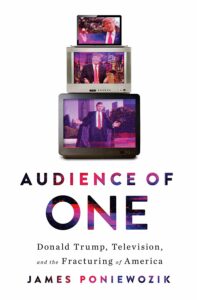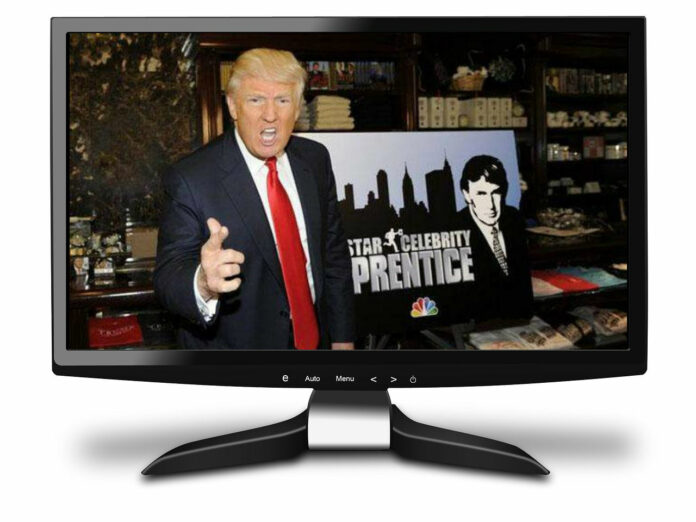 Donald Trump, reality TV star, has turned the presidency into an incredibly compelling reality TV show.
Donald Trump, reality TV star, has turned the presidency into an incredibly compelling reality TV show.
New York Times TV critic James Poniewozik (@poniewozik), in a marvelous new book — “Audience of One: Donald Trump, Television and the Fracturing of America” — explains how much control this gives Trump over the political media, which is dominated by television, and where entertainment values have subsumed news values.
Trump embodies the ideologies of reality TV:
That life is a constant, zero-sum competition, and if you are not beating someone then someone is beating you… That the best response to any controversy or crisis is to heighten the conflict… That people perform best when set to fight against one another for survival… That there is no history and no objective truth beyond your immediate situational interests, and that reality resets with every tweet or click of the remote.
And he’s perfectly suited for a TV news zeitgeist that “breathed in scandal and breathed out celebrity…. Do you want to break out? Act out.”
He has a freakish emotional bond with the TV camera, sharing its mentality: “no memory, no empathy, just on-state and off-state and the reaction in the moment.”
And since his election, he and TV news have shared an incredible mutualism:
The news was a feedback cycle of Trump being inflammatory, the news becoming inflamed, Trump growing inflamed by the coverage. The numbing round of feuds and outrages, shock after shock, felt like it had been programmed by a ratings-mad TV executive, because it away, it was.
Poniewozik explains how TV turned Trump into a star, and now helps him spread hate and fear, cast himself as a hero, define his enemies, and divide the nation.
But That Doesn’t Mean TV Criticism Is Good Political Reporting
It’s ironic that a TV critic delivers such great insights into the Trump era, because the political press corps – whose job it is to do just that – too often takes on the role of TV critic: judging each political act by its optics, its drama, and its ratings; focusing on how it looks, what’s next, and how it plays rather than what it is and what it means.
Consider, for instance, the news coverage of Robert Mueller’s testimony before Congress in July. As political theater, it lacked oomph. As a news event, it was historic, and an opportunity to refocus attention on his investigation’s grave findings.
Leading the pack, New York Times chief White House correspondent Peter Baker dismissed it as “The Blockbuster That Wasn’t“.
MSNBC’s Chuck Todd tweeted:
On substance, Democrats got what they wanted: that Mueller didn't charge Pres. Trump because of the OLC guidance, that he could be indicted after he leaves office, among other things. But on optics, this was a disaster. #MuellerHearings
— Chuck Todd (@chucktodd) July 24, 2019
Business journalist Heidi Moore (@moorehn) was enraged by all the reporters referring to the hearing as boring, and explained in a long Twitter stream that they need to lose their obsession with optics and focus on substance instead:
Here is what should happen: Every editor in chief of a major publication should gather their political reporting teams this week and do a very deep performance review of themes, reporting and staffing.
— Heidi N. Moore (@moorehn) July 26, 2019
She added:
3b. Optics+theater are not politics, they're advertising. Do you have political reporters, able to do the hard work of policy and sourcing? Or do you have advertising reporters reviewing House bills like Super Bowl commercials? Real advertising reporters are more rigorous, FYI.
— Heidi N. Moore (@moorehn) July 26, 2019
John Stoehr (@johnastoehr), who writes a daily newsletter about politics called Editorial Board, called out the elite media for engaging in a form of nihilism:
I mean the highest-profile reporters from the most influential outlets and publications, so-called professional truth-tellers who listened to Robert Mueller not with concern or worry or even fear, but with indifference. Everything is as good or bad as everything else in Washington, so nothing truly matters. Welcome to moral relativist hell.
Next Season Will Be More of the Same
Poniewozik, in his book, offers no reason to think that Trump’s ability to dominate political discourse won’t continue through the 2020 election.
And the clearest example of how entertainment values are perverting political media lately has been the Democratic presidential debates, especially the ones on CNN. Trump doesn’t appear, of course – but their production values create precisely the kind of vacuous, violent, circus atmosphere in which people like him thrive and democracy suffers.
The questions were idiotic, largely based on Republican talking points, and designed purely to inflict damage. There was an aggressive but entirely unacknowledged shilling for a centrist agenda.
David Dayen (@ddayen), the bold new editor in chief of the the American Prospect, wrote after the first sequence of debates:
CNN has no politics. CNN has no understanding of politics or policy. … The CNN debate was an inevitable by-product of turning news into an entertainment and cultural product….
Entertainment industry morons only understand how to stage television through the lens of forcing conflict. The questions weren’t really prompts as much as they were invitations to fight….
Jeff Zucker thinks it’s good television to stage a play that has pyrotechnics in it…. [T]he empty suits at CNN trying to create “matchups” and “drama” have corrupted us all, as much as anything else in politics.
And in fact, as Sarah Ellison reported for the Washington Post, Zucker, the man responsible for “The Apprentice”, was micromanaging it all.
